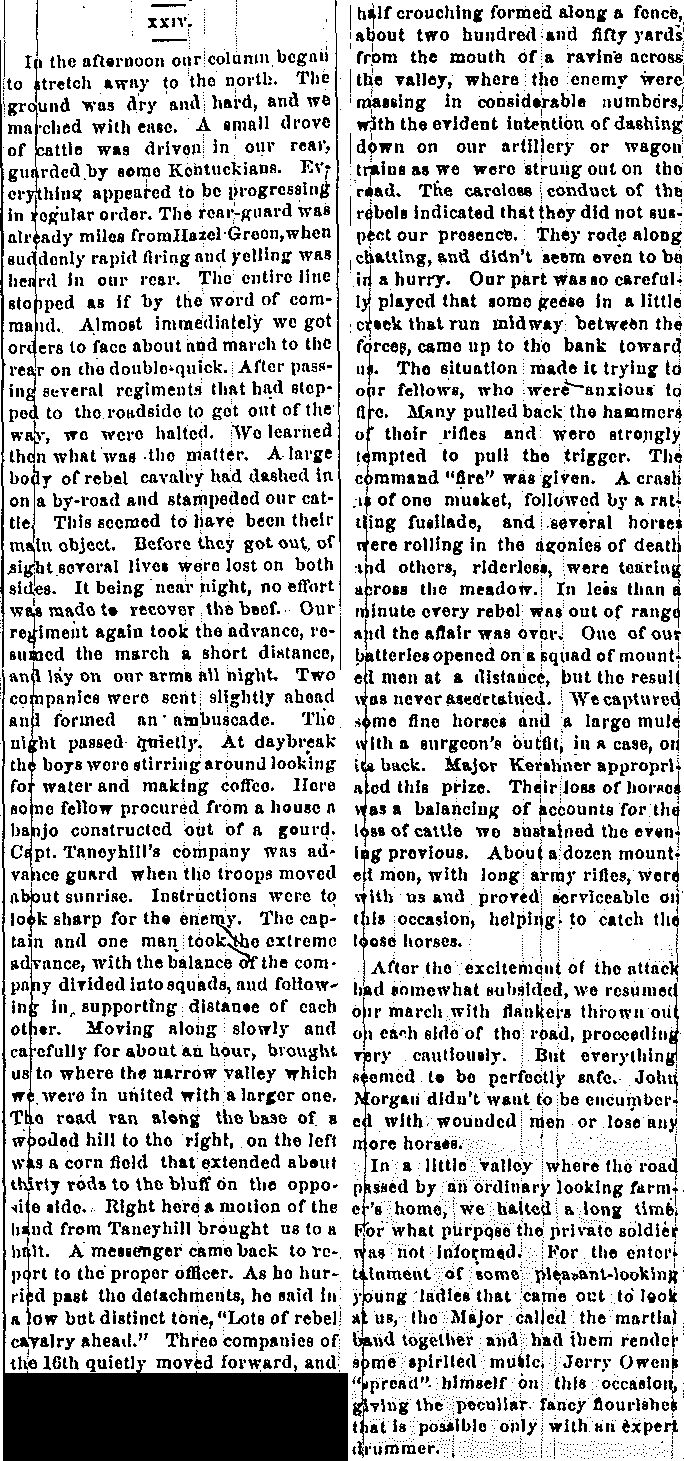| Camp & Field Page 38E | Camp & Field Index Page | 16th OVI Home Page | Camp & Field Page 38G |
The Camp & FieldArticles by Theodore Wolbach |
 Cpl. Theodore D. Wolbach |
The following image is taken from a book titled "Mortality and Statistics of the Census of 1850" in which it is believed retired Captain Rezin H. Vorhes, Company H, pasted over the pages a series of articles written by Cpl. Theodore D. Wolbach, Company E, titled "Camp and Field" and published, by chapter, in the Holmes County (Ohio) Republican newspaper from February 24, 1881 to August 17, 1882. The articles tell the story, in great detail and color, of the 16th OVI, from the inception of the 3-year regiment in October, 1861, through all its camps, battles and marches until it was disbanded on October 31, 1864. The articles pasted in the Vorhes book cover the first 35 chapters, published through October 20, 1881. All the remaining chapters were recently found in a Holmes County library by researcher Rob Garber who obtained copies, performed the transcriptions and provided to this website and which are also presented here, thus providing the complete work by Theodore Wolbach.
Throughout these articles click on the underlined white text for additional details.
The webauthor thanks 16th Ohio descendant Rob Garber for his excellent research on the Camp And Field articles and for performing the tedious digital transcription of those articles found on each page. The transcriptions were made to reflect the original articles verbatim, misspellings and all. Rob is the 3rd great nephew of Capt. William Buchanan, Company F, 16th Ohio, who served in the 90-day regiment as a private, re-enlisting in the three year regiment, and eventually making the rank of Captain of Company F. Thanks Rob!
Page 38F - Chapter 24 - September, 1862
 |
Published in Holmes County Republican XXIV. In the afternoon our column began to stretch away to the north. The ground was dry and hard, and we marched with ease. A small drove of cattle was driven in our rear, guarded by some Kentuckians. Everything appeared to be progressing in regular order. The rear-guard was already miles from Hazel Green, when suddenly rapid firing and yelling was heard in our rear. The entire line stopped as if by the word of command. Almost immediately we got orders to face about and march to the rear on the double-quick. After passing several regiments that had stopped to the roadside to get out of the way, we were halted. We learned then what was the matter. A large body of rebel cavalry had dashed in on a by-road and stampeded our cattle. This seemed to have been their main object. Before they got out of sight several lives were lost on both sides. It being near night, no effort was made to recover the beef. Our regiment again took the advance, resumed the march a short distance, and lay on our arms all night. Two companies were sent slightly ahead and formed an ambuscade. The night passed quietly. At daybreak the boys were stirring around looking for water and making coffee. Here some fellow procured from a house a banjo constructed out of a gourd. Capt. Taneyhill's company was advance guard when the troops moved about sunrise. Instructions were to look sharp for the enemy. The captain and one man took the extreme advance, with the balance of the company divided into squads, and following in supporting distance of each other. Moving along slowly and carefully for about an hour, brought us to where the narrow valley which we were in united with a larger one. The road ran along the base of a wooded hill to the right, on the left was a corn field that extended about thirty rods to the bluff on the opposite side. Right here a motion of the hand from Taneyhill brought us to a halt. A messenger came back to report to the proper officer. As he hurried past the detachments, he said in a low but distinct tone, |
half crouching formed along a fence, about two hundred and fifty yards from the mouth of a ravine across the valley, where the enemy were massing in considerable numbers, with the evident intention of dashing down on our artillery or wagon trains as we were strung out on the road. The careless conduct of the rebels indicated that they did not suspect our presence. They rode along chatting, and didn't seem even to be in a hurry. Our part was so carefully played that some geese in a little creek that run midway between the forces, came up to the bank toward us. The situation made it trying to our fellows, who were anxious to fire. Many pulled back the hammers of their rifles and were strongly tempted to pull the trigger. The command After the excitement of the attack had somewhat subsided, we resumed our march with flankers thrown out on each side of the road, proceeding very cautiously. But everything seemed to be perfectly safe. John Morgan didn't want to be encumbered with wounded men or lose any more horses. In a little valley where the road passed by an ordinary looking farmer's home, we halted a long time. For what purpose the private soldier was not informed. For the entertainment of some pleasant-looking young ladies that came out to look at us, the Major called the martial band together and had them render some spirited music.
Jerry Owens |
| Camp & Field Page 38E | Camp & Field Index Page | 16th OVI Home Page | Camp & Field Page 38G |